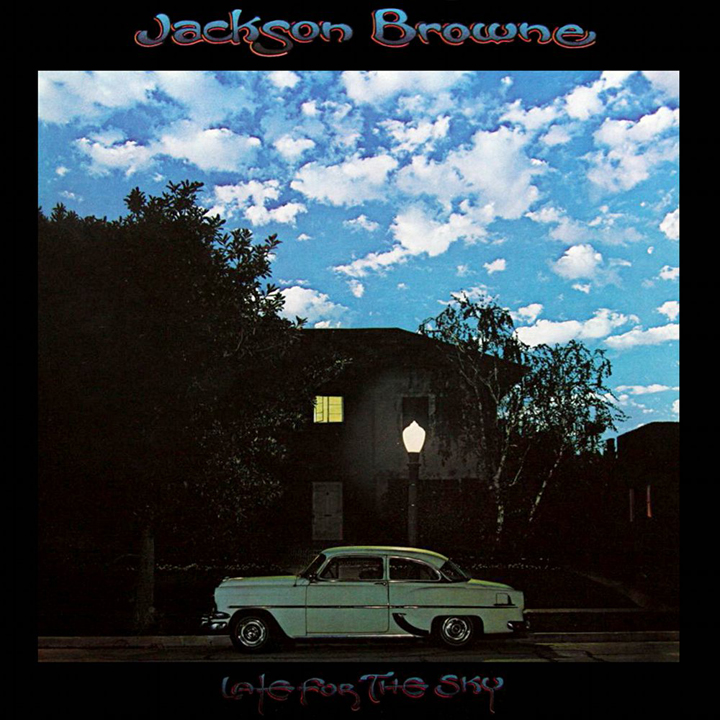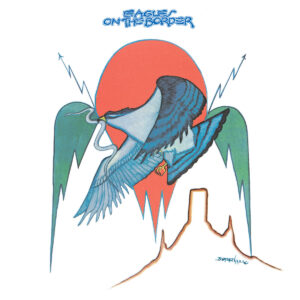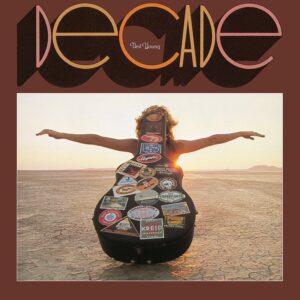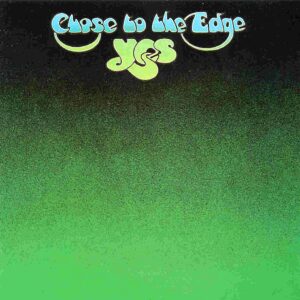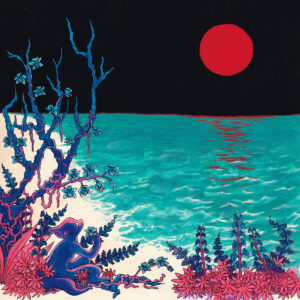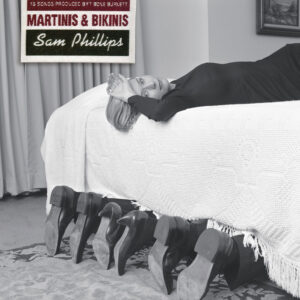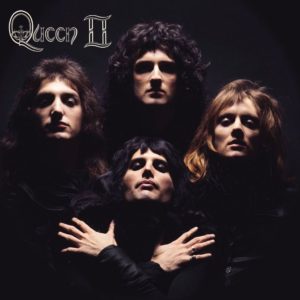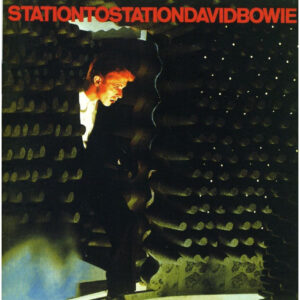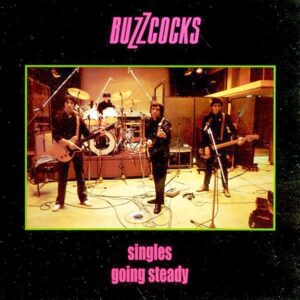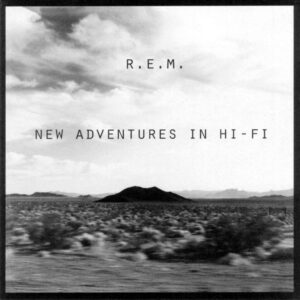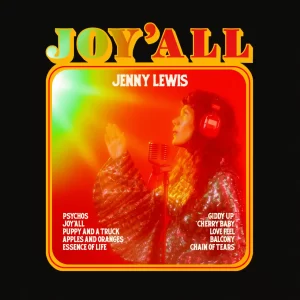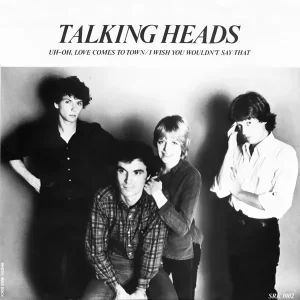
Jackson Browne is perhaps the archetypal 1970s singer-songwriter – a Californian who wrote sensitive, eloquent songs. Browne was involved with practially everyone on the soft-rock scene. This include the Eagles (he wrote their breakthrough hit ‘Take It Easy’), Joni Mitchell (the end of their relationship inspired ‘Car on the Hill’ from Court and Spark), while David Crosby and Graham Nash sing backing vocals on his debut album. Browne also launched the career of Warren Zevon, producing his breakthrough 1976 album.
Introduction
Browne was born in Germany, the son of a serviceman. He first emerged as a teenage songwriter, writing ‘These Days’ for the Nitty Gritty Dirt Band, and dating Nico. In the early 1970s, he joined Geffen’s Asylum record, and released his debut album in 1972. After four singer-songwriter albums, he produced his best-known work, 1977’s live Running on Empty, which featured all-new songs.
I’ve relied on a compilation to cover his work in the 1980s and 1990s, but he did have some strong songs later in his career – ‘Somebody’s Baby’ from Fast Times in Ridgemont High is the catchiest pop hit he ever wrote, while there are beautiful songs like ‘Sky Blue and Black’ and ‘In The Shape of a Heart’ on his later records. He also became noticeably more political later in his career, with songs like ‘Lives In The Balance’.
Browne’s appeal is primarily as a lyricist – if you’re not a lyrics-oriented listener, his appeal may elude you. But I think he writes beautiful words, contemplative and philosophical, like the title track from Late for the Sky.
How long have I been sleeping
How long have I been drifting alone through the night
How long have I been running for that morning flight
Through the whispered promises and the changing light
Of the bed where we both lie
Late for the sky
Jackson Browne 1970s Album Reviews
Favourite Album: Late for the Sky
Overlooked Gem: The Pretender
Jackson Browne (Saturate Before Using)
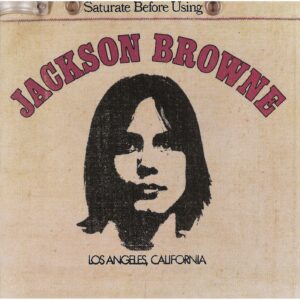
1972, 6.5/10
Jackson Browne had been kicking around the Californian music scene for a few years by 1972, and had already written successful songs like ‘These Days’. But it wasn’t until David Geffen created his Asylum label that Browne launched his recording career. The album’s officially titled Jackson Browne, but it’s often known as Saturate Before Using, due to the words on the cover. It’s my least favourite of Browne’s albums from the 1970s – the singles ‘Doctor My Eyes’ and ‘Rock Me On The Water’, as well as ‘Jamaica Say You Will’ are the easy standouts here, and the album tracks are often too subdued and rambling to be effective. There’s plenty of LA muso power here, with Crosby and Nash on backing vocals, and session regulars like Craig Doerge, Leland Sklar, and Russ Kunkel, but they’re often used sparingly.
As you’d expect with Browne, the main interest is often lyrical. Opening track and single ‘Doctor My Eyes’ is straight into examining the souring of the 1960s dream (“Doctor, my eyes have seen the years/And the slow parade of fears without crying/Now I want to understand”), while ‘Song For Adam’ mixes an elegy for a deceased friend with a lament for humanity. The best songs have fuller arrangements – ‘Rock Me On The Water’ has a gospel feel, while ‘Jamaica Say You Will’ works with its warm piano chording, and both songs are given depth from David Crosby’s backing vocals. The deep cuts are tough going though – I like the stripped-down ‘Something Fine’, but often they’re rambling and unfocused.
There’s some good writing, but Jackson Browne is the composer’s least adorned album of the 1970s and suffers accordingly.
For Everyman
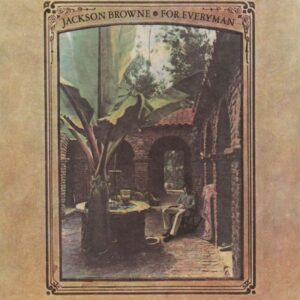
1973, 7.5/10
Jackson Browne had some very good songs but often dragged, especially as Jackson Browne’s boyish voice isn’t always engaging. The arrangements are much fuller on sophomore album For Everyman, which helps immeasurably. The most significant addition is guitarist and multi-instrumentalist David Lindley, who’d remain part of Browne’s team for the rest of the 1970s, and his guitar playing livens up Browne’s thoughtful songs. But there’s also a ton of star power here – Elton John plays piano on ‘Redneck Friend’, Joni Mitchell plays electric piano, Don Henley and Glenn Frey drop by for backing vocals, while plenty of prominent LA studio musicians, like Toto’s David Paich also appear. The album’s also notable for Browne raiding his back-catalogue – while his debut featured new material, he goes into his vaults for his own versions of ‘Take It Easy’ and ‘These Days’.
It’s nice to have Browne’s version of ‘These Days’, but my favourite song here is the title track, a lengthy rumination on escaping the end of civilisation by boat, inspired by his time living on board David Crosby’s boat – Crosby contributes backing vocals. Elsewhere, ‘Redneck Friend’ moves with John’s piano propelling it, while ‘Ready Or Not’ is nakedly autobiographical of Browne’s unsettling domestic life with his new wife Phyllis Major.
A large step up from Browne’s debut, For Everyman benefits from its fuller arrangements and from David Lindley’s guitar.
Late For The Sky
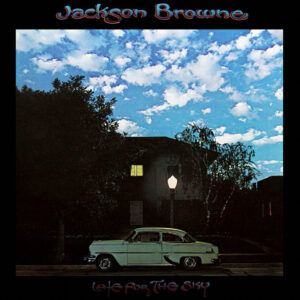
1974, 9/10
Jackson Browne attained peak Jackson Brown-ness with his third album, Late For The Sky, featuring epic ruminations on death and the apocalypse. For Everyman had gone over budget, so to cut costs, Browne utilised his road band in the studio, and they sound great. Most importantly, David Lindley’s guitar and fiddle are still featured, while the guest stars are largely relegated to backing vocals, most significantly Don Henley on ‘The Late Show’.
I only count one weak song on this album – ‘Walking Slow’ is a pedestrian rocker that never quite ignites. But the rest of the material is first-rate from Browne – the title track is my favourite song of his, a searching ballad where my favourite moment is the way Browne’s voice cracks on the last note. On ‘Farther On’, Lindley’s guitar searches while Browne’s philosophising collapses under its own weight (“I’m not sure what i’m trying to say/It could be I’ve lost my way/Though I keep a watch over the distance/Heaven’s no closer than it was yesterday”). Browne’s at his most serious on ‘Fountain of Sorrow’, ‘For A Dancer’, and the apocalyptic ‘Before The Deluge’, and the rocker ‘The Road and the Sky’ is necessary for a pick-me-up in the middle of the record. The call and response vocals of ‘The Late Show’ are another moment of levity in an otherwise ultra-serious album.
Late For The Sky is Browne’s peak, a sensitive songwriter almost overwhelmed by his insights into the human condition.
The Pretender
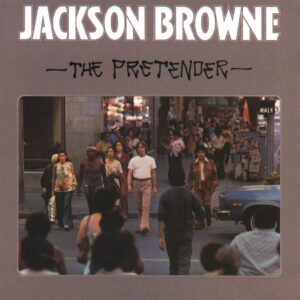
1976, 8.5/10
Jackson Browne had already spent most of the 1970s wrestling with mortality on songs like ‘For A Dancer’ and ‘Song For Adam’, and The Pretender was informed the suicide of Browne’s wife Phyllis Major during recording, leaving Browne a young widower. The only song directly inspired by these tragic events was the brief ‘Sleep’s Dark and Silent Gate’, and it’s devastating, half-formed and emotionally naked. Springsteen associate Jon Landau produces, and it’s the slickest Browne album of the 1970s, limiting Lindley’s contributions and using a cast of studio cats like drummer Jeff Porcaro, bassist Chuck Rainey, and Fred Tackett, Bill Payne, and Lowell George from Little Feat.
George’s slide guitar and backing vocals and Payne’s organ, along with Roy Bittan on piano, underpin my favourite track, ‘Your Bright Baby Blues’, where Browne’s warm melody is punctuated beautifully by the virtuoso band. Phyllis Major’s mother Nancy Farnsworth received a co-writing credit for ‘Here Come Those Tears Again’, while the intensity of opener ‘The Fuse’ is one of Browne’s best album tracks. The title track is notable for its yuppie dismissing lyrics, although it’s arguably overwhelmed by the slick sound.
The Pretender is often gorgeous, another searching record with dark and emotional undertones from Browne.
Running on Empty
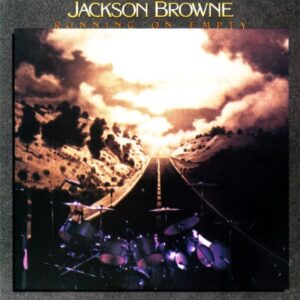
1977, 8/10
Unusually, Jackson Browne’s first live album was comprised of all previously unrecorded songs, recorded on stage or in other tour locations like backstage and in hotel rooms. It’s Browne’s best known work – it’s tangibly more relaxed and less ambitious than his earlier albums, and connected to the wider public more easily. Browne was able to afford a strong touring band by this point – David Lindley is on lap steel guitar and fiddle (as well as falsetto vocals on ‘Stay’), while other well-known studio musicians like Craig Doerge, Russ Kunkel, Leland Sklar, and Danny Kortchmar are in the touring group. Browne only has two sole writing credits on the album, and a lot of the songs feature co-writers or are covers, including Danny Kortchmar’s ‘Shaky Town’.
The album’s two best-known songs bookend the album – the title track has a sweeping, Springsteen like quality, and it’s as close to rock that the usually contemplative Browne ever came, although it’s still tinged by nostalgia. The closing medley of ‘The Load-Out’ and ‘Stay’ goes from the contemplative account of a roadie’s experience on tour to a light-hearted version of the 1960s song, with Browne, backing vocalist Rosemary Butler, and Lindley all alternating lead vocals. There are obvious themes that Browne explores in the album’s lyrics, around the seedier side of life on the road – notable examples include the masturbation puns of ‘Rosie’ and a cover of ‘Cocaine’ with extra lyrics from Browne and Glenn Frey.
It’s a relatively light, relaxed album after Browne’s ultra-serious earlier albums in the 1970s, but Running On Empty is a strong record, and it’s not surprising that it’s Browne’s best-remembered work.
The Very Best of Jackson Browne
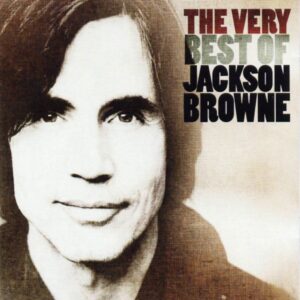
2004, 9/10
If you want a one-stop shopping solution for Browne, this 2004 double disc best of is a very good career summary. The first disc covers his 1970s albums, through to Running On Empty, and it generally hits most of his high points, even if I miss a few strong tracks from Late For The Sky like ‘Farther On’, and ‘The Fuse’ from The Pretender.
The second disc is given over to 1977 through to 2002. While it’s not as consistent, Browne still had a bunch of later career highlights. ‘Somebody’s Baby’, from 1982’s Fast Times at Ridgemont High is the catchiest that Browne ever got, a slinky pop hit. 1983’s ‘Lawyers in Love’ is a truly bizarre exploration of the Reagan era and the Cold War. 1986’s ‘In The Shape of the Heart’ is another heart-wrenching look at his relationship with Phyllis Major, while I assume ‘Sky Blue and Black’ concerns the end of a tumultuous relationship with Daryl Hannah. Browne also became more political in the 1980s, and ‘Lives in the Balance’ is remarkably astute political commentary for a pop song (“On the radio talk shows and TV/You hear one thing again and again/How the USA stands for freedom/And we come to the aid of a friend”).
The Very Best Of Jackson Browne is a good career summary, and Browne made some very good songs after his 1970s heyday.
Ten Favourite Jackson Browne Songs
Late For The Sky
Farther On
Your Bright Baby Blues
Running On Empty
For Everyman
Stay
Somebody’s Baby
Sky Blue and Black
In The Shape of a Heart
Jamaica Say You Will
Back to 1970s Album Reviews….
Related Pages
About
Aphoristic Album Reviews is almost entirely written by one person. It features album reviews and blog posts across a growing spectrum of popular music.
Review Pages
Read about the discographies of musical acts from the 1960s to the present day. Browse this site's review archives or enjoy these random selections:
Blog Posts
I add new blog posts to this website every week. Browse the archives or enjoy these random selections:
